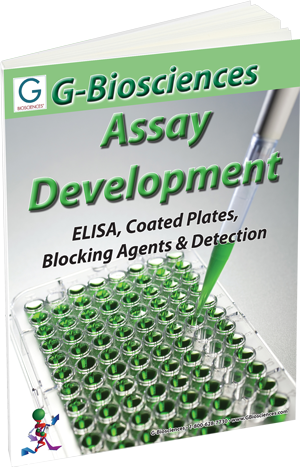Develop your own ELISA Assays
Features Coated Plates, Blocking and Wash Agents & Detection Reagents
DOWNLOAD NOW
 The Assay Development Guide focuses on the development of ELISA, a key research tool, with a brief overview of ELISA and key protocols. The guide features a vast selection of pre-coated plates, blocking agents, detection substrates and labeling reagents, including fluorescent dyes
The Assay Development Guide focuses on the development of ELISA, a key research tool, with a brief overview of ELISA and key protocols. The guide features a vast selection of pre-coated plates, blocking agents, detection substrates and labeling reagents, including fluorescent dyes
The ELISA Development Handbook features the following sections:
- Introduction
- Featuring an overview of the ELISA principle and a general ELISA protocol
- Coated 96 well plates
- Available in clear, black or white for colorimetric, fluorescent and chemiluminescent assays respectively.
- Plates for Antibody Binding
- Coated with Protein A, Protein G, Protein A/G, Protein L or α-rabbit or mouse antibodies
- Plates for Biotin Binding
- Designed to immobilize biotinylated biomolecules through Neutravidin and Streptavidin
- Plates for Protein and Peptide Binding
- Bind your protein or peptide of choice through their primary amines or sulfhydryls. Alternatively, couple GST or 6X His tagged proteins to glutathione and nickel coated plates.
- Blocking Agents
- Large selection of blocking agents, including non-animal blocking agents, non-sera animal protein blockers and other protein blocking agents
- Washing Agents
- PBST, TBST and a large selection of proteomic grade detergents
- Detection Probes
- Enzyme conjugated secondary antibodies with horseradish peroxidase (HRP) and alkaline phosphatase (AP)
- Antibody Labeling
- Fluorescent dye labels and biotin labeling reagents
- Detection Substrates
- Colorimetric and chemiluminescent enzyme substrates for detection
Complete the form below to receive your ELISA Development Handbook

